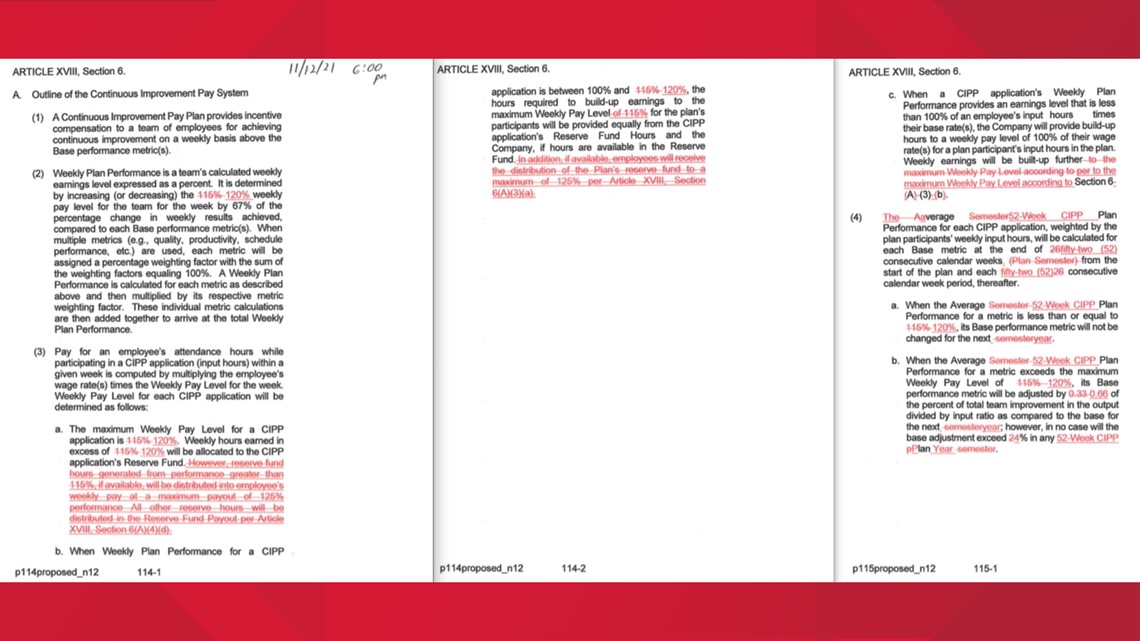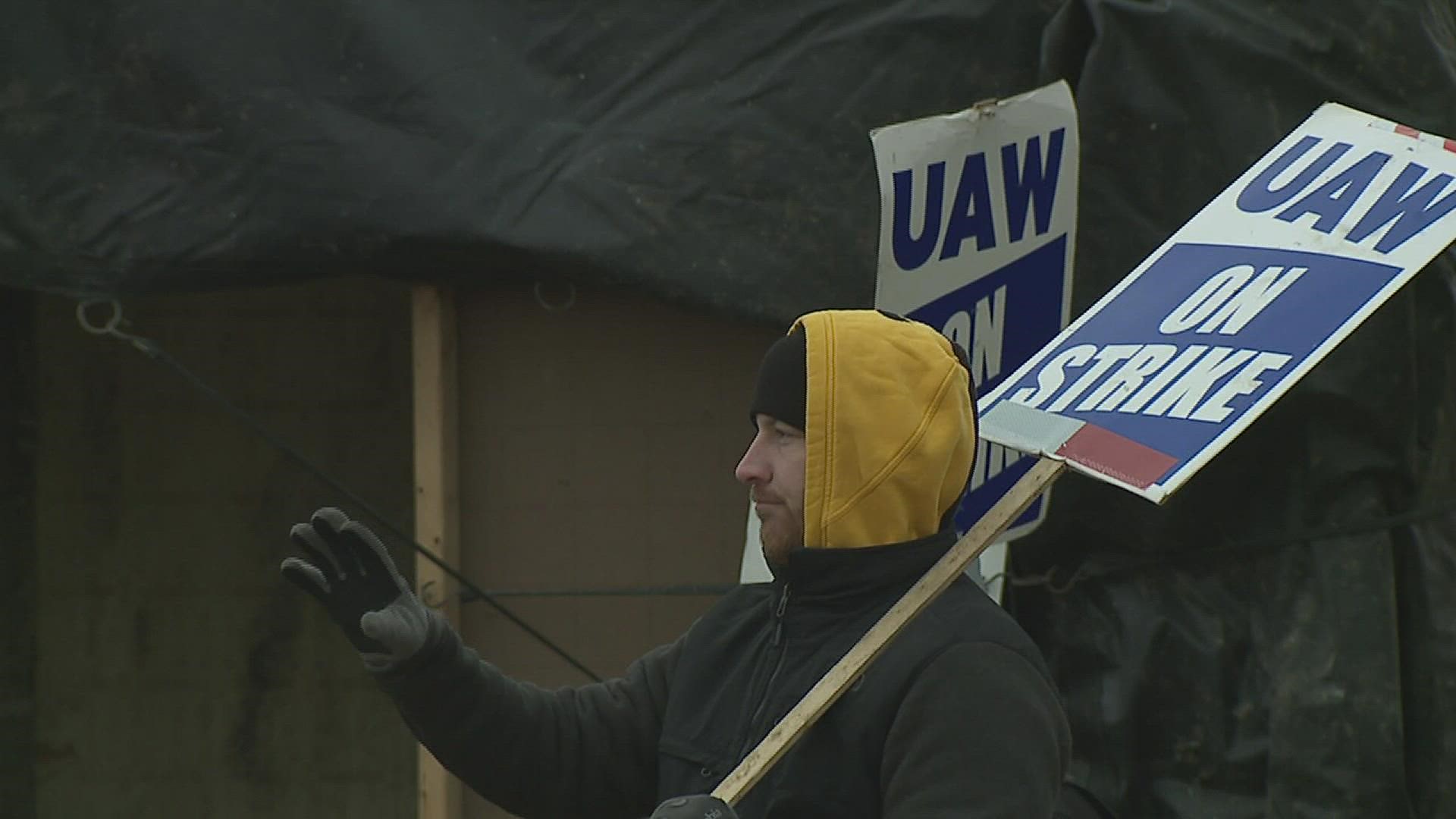EAST MOLINE, Ill — Roughly 10,100 members of the United Auto Workers union will be able to vote on the latest offer from Deere & Co. on Wed., Nov. 17.
The agreement will be an updated version of the second contract offer, rejected on Nov. 2, with what the union described as 'minor modifications.' It continues to include benefits such as an immediate 10% raise, followed by a 5% raise on years three and five of the contract, with lump sum bonuses on years two and four.
Deere had previously called the second offer its 'last, best and final' before it was voted down by 55% of union members.
What's new in this offer?
According to agreement documents released on Waterloo Local 838's Facebook, one of the modifications to that rejected agreement was an increase in Deere's weekly, production-based bonuses known as 'Continuous Improvement Performance Plans,' or CIPP for short.
Workers under CIPP are placed on teams within Deere's different facilities. Each team is given a performance goal, with an incentive to exceed that target through the CIPP bonus. Under the current contract, teams reaching 115% of their goals receive a 15% pay increase for that week. If the output were to exceed that 15%, the extra money is put into a reserve fund and divvied up among workers at the end of the quarter.
Under the latest ratifications to the second contract offer, that cap would be raised up to 20%, potentially meaning workers could receive more money on their paychecks week-to-week.
Another proposed change to the CIPP program could be found in Deere's efficiency measurements. Like before, the newest offer would examine how often each team is meeting and exceeding CIPP expectations.
Right now, Deere looks at six month periods to measure averages and trends for a individual team's CIPP goals. Under the proposed changes, that timeframe would lengthen to a year.
When the company concludes a team is overachieving, over the course of the CIPP timeframe, their performance targets are increased. As it stands right now, teams that cannot continue to reach the increased goals in the following six month - thereby not qualifying for the weekly CIPP incentive - see lower weekly paychecks even though their wages did not decrease.
"It's the most complicated pay system that I've encountered in my career," said Michael Childers, a professor of labor education at the University of Wisconsin-Madison. "It's like the hamster wheel starts spinning faster. So to run and stay in place, you got to run faster, to keep making the same money."
The program has been a continual sore spot for many union members, who have calling for reforms to the incentive structure throughout the strike.
"(Deere has) a sliding pay structure by which, unless workers figure out a better, faster way to do stuff, over time, their pay literally starts to go down," Childers said. "So in order for them to maintain their earnings, as they produce a part over time, they have to come up with a way to produce more parts to maintain the same pay."
Not every Deere employee operates under the CIPP program. Some hourly workers who spoke to News 8 anonymously said they plan to vote 'no' on Wednesday's vote, since the majority of the new changes don't benefit them.
Childers added the change also seems to fall in line with Deere's wording of a 'last, best and final offer,' since it wouldn't appear to make an impact on the company's bottom dollar.
"In a real sense, the worker is getting more money. When that happens, when they produce more product, that's more product Deere has to sell at their margins. And again, that incremental contribution to the cost of that labor is way more than offset by the additional tractors that Deere now has available to sell," he said. "These changes are really kind of self-funded."


What are the chances the ratification passes?
With just over 9,000 of Deere's UAW members voting, the company's second contract offer was rejected by a 55-45% margin on Nov. 2. However, that gap was much closer than the first proposed contract, which was shot down by roughly 90% of union workers on Oct. 10.
While the latest vote won't be on a fully new contract, one Harvester Works employee, who is remaining anonymous by request, said the ratification changes might be enough to push just the right amount of workers over to the "yes" side.
The employee said it's been a long month on the picket lines, especially as temperatures continue to drop, and strike pay trickles in as the holidays approach.
"Ten thousand families are making some really tough decisions right now," said Childers. "In this race to see who's in more economic discomfort first, John Deere or individual families, I think we all know the answer to that, right? It's tough for these folks. They're not used to not being able to make their bills. And now they're looking at a stack of bills and saying, 'I don't know which one of these I'm not going to pay this month.'"
Childers predicted there might be even higher turnout among union members for Wednesday's vote, calling it a situation where "every vote does matter."
"Union leaders tend to be more conservative, and there tend to be more outspoken groups that basically want to change the world at the bargaining table," he said. "In the middle of that, somewhere, is most of the people, who are literally just weighing 'how much money do I have left in the bank? Do I think this is probably the best we're going to be able to do this round?'"

